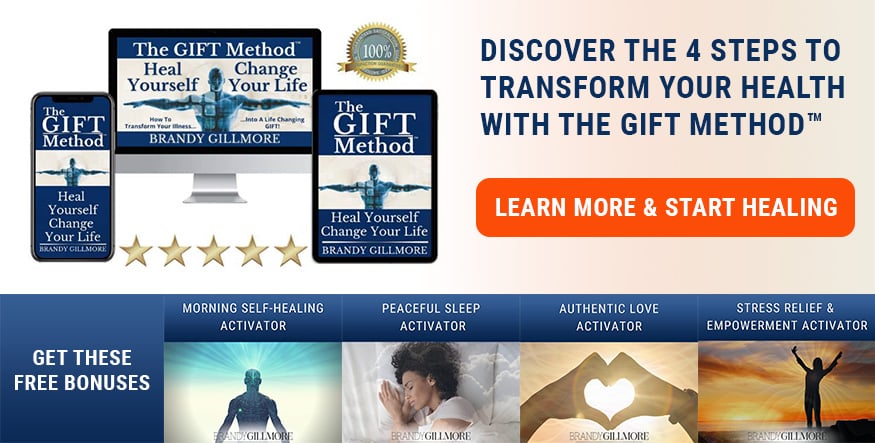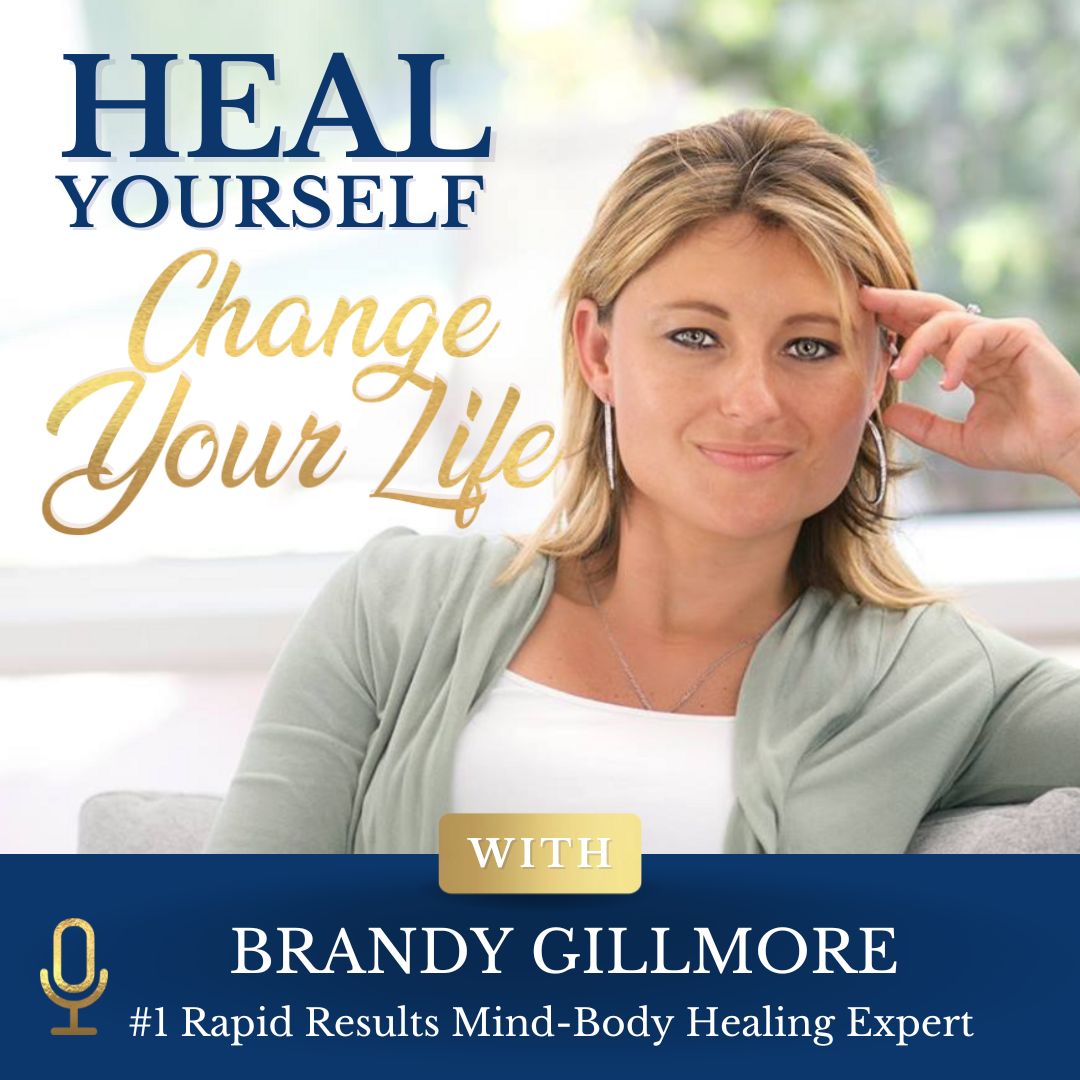Click here to listen to episode IQ-60
Please note: These are computer generated transcripts of the Heal Yourself, Change Your Life Podcast Episodes. If you have any questions or need assistance, please reach out to us at support@brandygillmore.com
Welcome to Heal Yourself, Change Your Life. My name is Brandy Gillmore, and after recovering from my own life changing injury, it's become my mission to share with others the same discoveries I made. that changed my health and my entire life. Our minds are truly incredible. The placebo is proof of this.
Each week I will take this simple awareness to a whole new level. I will even coach live callers to free themselves of physical pain using only their mind. And then I'll provide you with a combination of practical and spiritual insights that you can use to master your mind and body. Your emotions and your energy to help you heal your health, yourself and your life.
Let's begin.
Hello and welcome to this week's quick IQ episode where we talk about insights and questions. And today I have a really great question from a listener based off of last week's IQ episode. So I'm going to go ahead and read the question. So I'm that question and then I want to kind of look at the bigger picture.
And so here we go. So her email says, hi, Brandy, I really enjoyed last week's IQ episode, and I also wanted to ask What if I like to talk about negative things? All right. So we're going to go ahead and unpack this. And by the way, I got one other person who also messaged in something similar and hers said something to the effect of, you know, what if I like to talk about negative things, I feel like there's so many negative things in the world that it's important to talk about.
to talk about them. All right. So we're going to unpack this topic on talking about negative things. And so first and foremost, you know, the reality of it is, is that if we look at every podcast episode, you know, a lot of times the very thing that we're doing is we are talking about something negative and then.
Okay. So we can see, by the way, as we do that, people are literally going from feeling in extreme pain to having no pain. So we can see that when we take something negative and we let it go and we go into the positive, we can see the immediate results. I mean, there are people who have let go of neck pain or back pain or foot pain or knee pain or, you know, I mean, even there's an episode where there was a woman who, you know, was what, 80 percent blind and was able to shift and have her eyesight come back as we were working.
I mean, there's all kinds of things. And if you think about it, it's from taking something that was negative and transforming it and letting it go and shifting it. to be able to really start looking at things in a positive way. So, that's kind of foundational. Now, we're going to go ahead and unpack it even more, but if we look at taking something negative and really letting go of, not just the thought and talking about it, but the feeling itself, it creates a radical shift in life.
And, by the way, I don't just see this with health, but, Of course, all of the time with life and manifesting and what's being attracted in to our lives. And so that is important now, unpacking these questions. So, uh, one question was, you know, well, I think it's important to talk about the negative and I would say, yes, sometimes.
So I would say, yes, absolutely. It is important to talk about the negative. As long as you're wanting to do so in a productive way. And what I mean by that is, you know, if there is. an outcome, if there's an intention for a positive outcome, then absolutely. So even, you know, of course, going back to every single episode, that's exactly what we're doing.
Our goal isn't to just sit and talk about the negative. Our goal is to take it and transform it and look at it, identify the problem, then really then move it into a very empowering place. Okay, so that, of course, is the goal. And so, I would say that, to answer this question, I would say first and foremost, if you are having negative conversations.
That's not a bad thing as long as the goal is to genuinely turn it into something productive or something that is, has a positive outcome. So even in a relationship, let's say you're like, Hey, we had this problem and let's talk about it. But when you do talk about it, your goal isn't to like, pound the other person into the ground, or make them wrong, or, you know, attack them.
Your real genuine goal is to come out on the other side better, and, and really move into a positive place, whatever that might be. And so very simply put, Talking about the negative, if there is an intention to really find something productive, to turn it into positive, or even if there's a negative thing going on and you are working on making a plan.
to take action to make it better in life. Great. Okay. Otherwise, if you find yourself talking about the negative, there's a few things that you're going to want to know. First and foremost, that of course, as you can see from each episode, that it can create more pain and more health issues. And I see that all of the time.
Now, another thing that you'll want to note is this, and this is where it can be a bit tricky. is that sometimes people will say, well, you know what, if I just talk about the negative, I feel a sense of relief. Okay. Now that part can be tricky because you want to make sure that you're coming to a resolution for the relief.
Because a lot of times what can happen is that a person can speak about the negative and then as they do, They get their patterns reinforced and it can feel good and the easiest way to explain it is this, is, you know, the example you hear me unfortunately, you know, use all the time of, of a cutter, you know, somebody who unfortunately cuts themselves and feels a feeling of relief or euphoria from doing so.
Now, if they're feeling relief or euphoria from doing so, then they, you know, there's a part of them that wants to continue to do it. And it's not like obviously they didn't link it up on purpose. They didn't say, okay, I'm going to cut myself and I want it to feel really good. You know, that's not what happened.
Things get linked up in the subconscious mind. that then drive our lives sometimes very much in the wrong direction. And so people can have it linked up very strong in their mind that heroin is great, or meth is great, or alcohol and getting really drunk every night is great, or talking about something negative all the time is great, or Putting people down feels good to them or making fun of them or complaining or talking about the negative or even there's things like, uh, you know, pride in hardship where people are like, you know, you've probably heard this before where one person says, Oh man, I had a bad day.
This and this and this happened. And then somebody else says, Oh, you think that was bad? Let me tell you about my day. This and this and this and this happened. Well, what happens is they're actually, you know, one upping each other at who had the worst day, which of course links up a sense of pride or a sense of winning to have the worst day.
So their mind actually at a subconscious level. Um, wants to create more of that. And so that's really what I want to kind of open the topic here. As far as today's quick IQ episode is really looking at that in your own life. You know, if we take all of this awareness and we bring it together, we can say that number one to answer this question, you know, of what if I like to talk about negative things.
I would say, first and foremost, is that a link in your subconscious mind that's driving you in the wrong direction? And so, that's something that you'll want to ask yourself, you know, do you like to talk about negative things because there is a relief, or because it's productive, or because you're wanting a solution, or just because it feels good to either connect with people that way, or vent, or have people give sympathy, or have people say, oh, you're right, and have that reinforcement.
You know, what, what is it? And so that is what I would recommend from this episode is really being honest with yourself and asking yourself exactly that. Why do I feel great talking about the negative? Is it because it's productive and I feel like I'm really going to turn things around or really change things or really address things?
Because by the way, if you're talking about the negative from that place where you go, look, this happened and I want to create a solution or I want to figure it out or I want to turn it into a positive, that can feel really good to actually, to really address something. So, in other words, the answer to this question.
is very much dependent upon each person because while one person could be talking about something negative to find a solution, another person could be talking about something negative and it could be absolutely reinforcing the neural pathways for whatever health issue or whatever problem that's going on, or, you know, negative.
You know, it can continue to attract more of the same. So, you know, something you want to think about is this, is that all the time people go, well, if I just talk about the negative and talk about the negative and talk about the negative, can I just get it out? But that's not how the mind works. That would be like somebody saying, well, if I just talk about the alphabet and I talk about the alphabet over and over and over and over again, and I just talk about the alphabet.
over and over and over again. Before I knew it, it should be gone, out of my mind. Okay, obviously we know that's not how it works. If you continue to repeat the alphabet over and over and over, it ingrains it. And even with the negative, by the way, if somebody continues to talk about the negative over and over and over again, and they do so, and they start feeling positive about it, what they've really done is linked up positive things to the negative circumstance.
So, for example, um, when you link up positive things to a negative circumstance, would be the example of people one upping each other for having the worst day. You know, if somebody says, Oh man, the example of, Oh, my day was so much worse. I had this and this and this and this happened. Now what happens is they're talking about something negative, this, this negative thing, this negative thing happened, this negative thing happened.
And then in that conversation, they quote, unquote. win at it. Or that other person can say, you know, I'm so sorry to hear that. Are you okay? Can I get you anything? Can I give you a hug? And of course, what can happen is the negative gets linked up to positive, which, you know, if you go back to, uh, unfortunately, like a cutter who cuts themselves.
That's where you can see an example of a negative that gets linked up to a positive. And when that happens, it just can allow the pattern to perpetuate in your life. So again, I don't want to make this too complicated, trying to keep everything very simple. But the question was, I wanted to ask, what if I like to talk about negative things?
And it really comes down to. What is your intention in doing so? And how does it make you feel? And where are you really going with it? And being honest with yourself. And in some cases, great, maybe you listen to this and maybe you think, okay, look, I'm talking about the negative and I feel the need to talk about it.
And so when I do, I'm just going to set an intention first. That, hey, like my goal is to feel better and to get to a solution. Or my goal is to create a productive outcome from this. Great. So that could be one thing that you could do. Or the second thing, so number two, what you could do is when you notice yourself speaking about the negative.
You could see that there's some type of link that is in your mind that maybe you are enjoying it, but maybe it's not something you really want to enjoy, talking about the negative. So in that case, you'll want to make sure to remind your mind and reprogram that in your mind to make that change. You know, it's like an alcoholic who knows they need to quit, but if you ask them, you know, do you like going to the bar or do you like drinking?
Of course, they'll say yes. Yeah, it's The reason they keep going and there's a part of them that's like, you know, no, like, I want to change this. I want to do something different. And so if you're there with negative thinking or, you know, having quote unquote negative conversations, then you'll want to look at really creating that change.
wholeheartedly. And by the way, of course, as you can see from all of the volunteer episodes where you see people literally releasing pain or, you know, or creating different changes in health issues or, you know, all kinds of things. I mean, there's so many different types of ailments and issues that we've talked about on past episodes that you can see the power.
And really taking something that is negative and transforming it, letting it go. And by the way, on that note, if you remember Mia from two episodes ago, where she was absolutely, you know, in tears, having a lot of tears and a lot of emotions going on to getting to the end of our session going, I can't.
Like I, like saying, Oh my gosh, like I feel radically different. I feel so happy. I feel so good. I feel alive. I feel like, you know, and I think the words she used was that she could see herself in the mirror and that she could just tell herself that she loved herself and was happy and felt empowered. And it was just a beautiful feeling to go from the negative to the positive, you know, making that real connection.
And so I hope from this you get that it's not terrible to talk about the negative and addressing the negative is a good thing, but not hanging out there, not making it a pattern, not going there on a regular basis and reinforcing and reinforcing, but instead doing so in a way that allows you to constructively and productively move through it to transform your thinking and transform your life.
Because if you catch yourself. repeating the same types of patterns and the same type of pattern or complaining about the same things or whatnot, you know, that's not going to lead to healing. And it's definitely not going to lead to transformation. You know, of course, transformation is all about transforming things, you know, transforming your way of being, feeling, and thinking.
You know, so the more that we can transform ourselves, the more we can transform our health and our lives. And so that, of course, is the goal. And on that note, I'm going to ask you to please do make a point to share this episode. Share it with somebody you love, somebody you care about, somebody you don't even know, or even somebody maybe you've been a little stuck in the negative with where you guys talk about it and you're, you've been through it.
Going back and forth in the negative, you know, just complaining about things maybe or something like that. You say, you know what? Maybe you're gonna make a commitment to not do that anymore. And so maybe you send this episode to a friend and you guys do it together or something. You say, okay, look, we're committed to the positive, you know, so maybe that's something that you could do for yourself and your health and your life.
That would be great for you. So maybe there's that, but keeping in mind, you know, the more empowered that every single person is in our world, the better this world is for all of us. So please do hit the share button and I look forward to connecting with you on the next episode, where we'll take it to the next level.
I'll see you there. Have an incredible rest of your day.
Thank you for listening to Heal Yourself, Change Your Life. All of the time, people reach out and say how much these episodes have given them hope or touch their heart or help them stay positive in hard times, or even woken them up to a completely new level of awareness. Of how amazing we all really are.
If today's episode touched your heart or expanded your mind in any way, please do me a favor and be sure to share it with those you care about or those, you know, who really need it. As more and more people become empowered, it really will change our world for the better. That is the point, and the power of these demonstrations is to create a radical shift in our world consciousness by showing everyone what we are all capable of.
And of course, each volunteer will really need to follow through to reinforce their programming to maintain their results. But the point is for you to see that you really can create rapid results in your health and your life. If you really understand how to use your mind, you're incredible. And I do want to be clear though, that most people will not get results this fast on their own.
I make it look very easy because of the discoveries that I made. You'll want to remember that there's so much more going on in our minds at a deeper level than people realize. That said, if you want to send me any questions or comments, come visit me on my website at brandygillmore.com/podcast.
And if you're currently experiencing physical pain and would like to be a volunteer on the show, you can sign up there as well. Lastly, Please remember, if you do have any health issues, you won't want to avoid your doctors. Instead, you'll want to continue seeing them and make it your goal to blow their minds with what you're capable of with your mind.
Thank you.




